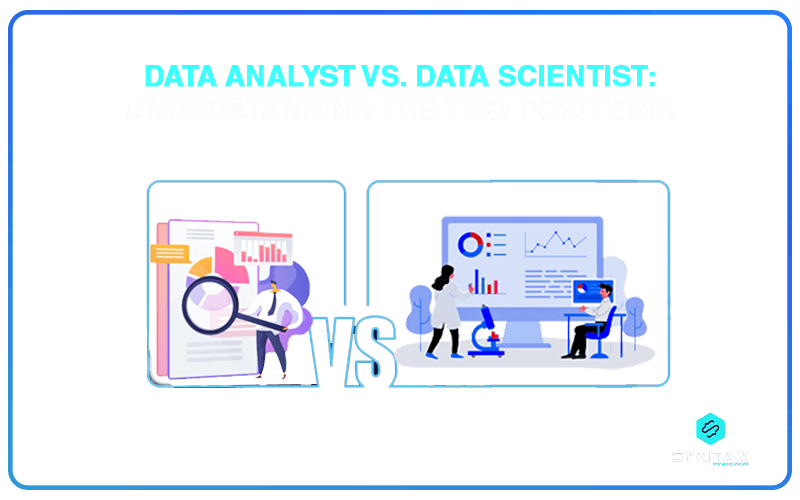There were 5 Exabytes of Information created between the Dawn of Civilization through 2003, but that much Information is now created every Two Days. – Eric Schmidt
The idea of Specialization of Labor became a raging principle as organizations expanded and became more and more diversified. The idea referred to the utility in breaking down larger tasks into smaller chunks and assigning the responsibility of completing each of the activity to specific individuals on the basis of their expertise.
Even though each individual happens to be single-mindedly committed to the task of accomplishing the goals of the organization, are they the same? The answer is definitely NO.
The same logic applies to the topic of Data Analyst vs. Data Scientist. The prefix of ?Data? in both the designations conveys a sense of similarity in terms of the fact that both individuals happen to deal with Data.
However, sharing similarity does not imply interchangeability. Thus, the question of Data Analyst vs. Data Scientist is very much a real one.
In this blog, we shall look at the topic of Data Analyst vs. Data Scientist. The issue will be sought to be understood through different lenses such as Data Scientist vs. Analyst: a Comparison of Skills, Roles and Responsibilities, Educational Background as well as Data Analyst vs. Data Scientist Salary. Consequently, we shall take up a tripartite comparison on the issue of Data Analyst vs. Data Scientist vs. Data Engineer.
Who are Data Analysts?
A Data Analyst is a qualified professional responsible for acquiring data from different sources, cleaning and organizing it as well as conducting data analysis on it. They happen to sift through data in order to identify patterns and trends (data mining), thus converting valuable business information into actionable insights.
They make use of different Data Manipulation techniques in order to interpret complex datasets. In this capacity, they should be proficient in deriving meaning from numeric data, have a strong grip over programming languages, as well as be adept in the fundamentals of data handling. They generally operate on structured data for resolving quantifiable business problems.
Aspiring to be a Big Data Analyst? Check out our blog on “How to become a Big Data Analyst?: Come find the Answers“
Who are Data Scientists?
Data Scientists generally hold senior positions and are possessors of advanced degrees. They utilize more advanced data techniques and strategies like neural networks, clustering, decision trees and so on; for not only interpreting and analyzing data, but also for making predictions about the future through building predictive models.
They are highly proficient in Coding, Statistics, Mathematical Modeling as well as Machine Learning. Skilled with advanced programming, they are capable of creating new processes for Data Modeling within the discipline of Data Science.
Who are Data Engineers?
If a Data Analyst and a Data Scientist occupies two ends of a straight line, a Data Engineer happens to be positioned somewhere in between those two end points. They are primarily responsible for preparing data for analytical and operational purpose.
In the capacity of a Data Engineer, you should be well versed with the maintenance and development of Data Architecture. They are proficient in creating and integrating APIs and have a strong understanding of Data Pipelining.
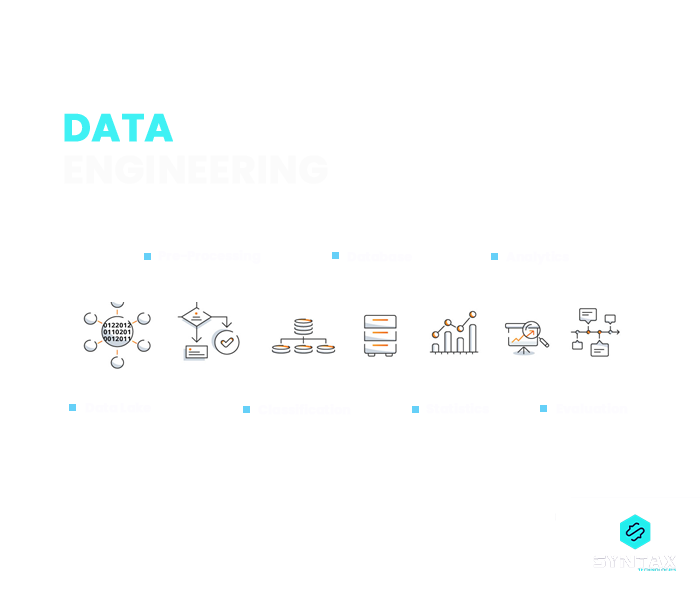
Data Analyst vs. Data Scientist: Similarities
The topic of Data Scientist vs. Data Analyst is not necessarily an elaboration of the differences between the two positions alone. A proper analysis of the two positions will be incomplete without looking at the issue of Data Analyst vs. Data Scientist in terms of the similarities between the two professionals.
Let us look at some points of overlap.
- Both are responsible for dealing with Data in the accomplishment of business goals. Thus, they are often found to be working in the same business units.
- They both leverage predictive analytics, statistical analysis and reporting techniques to understand trends and for analyzing data.
- Both roles require an understanding of programming, databases, machine learning algorithms, and other tools used for data manipulation and data analysis.
- A Data Analyst as well as a Data Scientist is required to possess excellent written and verbal communication skills as they are responsible for conveying their findings to business leaders.
- Both require expertise in traditional statistics.
- Data Analysts as well as Data Scientists play a critical role in helping organizations gain insights into their operations and performance through meaningful data-driven decisions which can have significant impacts on the bottom line of their respective companies or clients.
- Both the professions have garnered exceptional popularity in the public eye especially with the intensification of the wave of Data Boom.
Data Scientist vs. Data Analyst: Educational Requirements
If you are seeking to pursue a career as a Data Analyst, you can well be required to possess a bachelor’s degree in a related field like Statistics, Finance, Mathematics or Computer Science.
According to a survey conducted by IBM in 2017, very few job postings for Data Analysts require them to possess a Master’s degree.
On the contrary, an overwhelming majority of the Data Scientists happen to possess an advanced degree in the form of a master’s degree or a Ph.D in Mathematics, Data Science, Statistics or Information Technology.
According to a report produced in response to a study conducted by Burtch Works in 2020, 94% of the Data Scientists happen to hold a Master’s or a Doctoral degree.
Data Scientist vs. Analyst: Roles and Responsibilities
In this section, we shall look at the issue of Data Analyst vs. Data Scientist, in terms of what the two professionals are expected to do in their professional capacity.
Data Analyst
- Collecting Data from all possible Sources (Primary as well as Secondary)
- Identifying the Needs of the organization in liaison with the firm leaders
- Data Cleaning and Data Organization
- Writes SQL queries in order to derive Answers for Business Questions
- Work with customer-centric algorithm models
- Detect Data Quality Issues
- Conducting Analysis of Datasets in order to identify Trends and Patterns which could be converted into actionable Insights
- Design experiments, collect and interpret large amounts of raw information
- Applying Retrospective Analysis, Statistical Analysis, A/B Tests
- Designing and Creating Data Reports and easy to understand Data Visualization using different Reporting Tools
- Build predictive models using machine learning algorithms to forecast future outcomes
- Monitor constantly evolving industry standards to ensure compliance
- Assist in developing data governance policies and best practices.
Learn the intricacies of Business Intelligence Reporting, read our blog on ?Everything you Need to Know about Business Intelligence Reporting?
- Presenting one?s Findings and Conclusions in easily comprehensible forms of Data Visualization
Data Scientist
- Acquiring Data, Performing Data Cleaning and Processing Raw Data
- Making use of diverse tools like Python, Impala, Tableau, Excel, Hive, Hadoop and others, in order to develop and test new algorithms
Want to know more about Tableau, read our blog on ?What is Tableau?: Learn from the Basics?
- Creating complex queries using programming languages such as SQL, Python and R
- Designing Machine Learning Algorithms and Predictive Models for Mining Big Datasets
- Correlating disparate Datasets (structured and unstructured data) as well as trying to look for Patterns and Trends in Data
- Identifying new Business Questions that can add Value
- Developing Custom Data Algorithms and Models as well as processes for analyzing Data Accuracy
- Develop Test Model Quality and A/B Testing Framework
- Generating Reports, Dashboards and building Data Visualization Tools
- Working with stakeholders to understand requirements and develop reports to present findings in a meaningful way
- Leveraging AI/ML technologies (e.g., deep learning) for specific tasks like natural language processing (NLP) or computer vision
Data Analyst vs. Scientist: A Comparison of Skills
The issue of Data Scientist vs. Analyst can also be looked at through yet another lens and that is of the kind of Skills and Competencies which are significant for the respective professions.
Data Scientist vs. Data Analyst Salary: Difference in Career Prospects
An important point of difference between a Data Scientist and a Data Analyst is in terms of the estimated salary guaranteed within the two fields. This gap in the salary offered to a Data Scientist and a Data Analyst, is also because of the fact that different levels of experiences are required of them.
As per the report by Robert Half Technology (RHT)’s 2020 Salary Guide, the earning potential of Data Analysts is generally held to be in the estimated range of $83,750 and $142,500. Additionally, they have the option of increasing their market value by acquiring further new skills.
Moreover, Data Analysts who have over ten years of experience, often move into more profitable domains. In such a situation, the role of a developer and a position of a Data Scientist are quite attractive to them.
On the basis of the same report, the earning of a Data Scientist is generally held to be in the estimated range of $105,750 and $180,250. They too, have an extremely positive career path with numerous opportunities for improving their skills and advancing to senior roles such as that of a Data Engineer or a Data Architect.
Data Scientist vs. Data Analyst vs. Data Engineer
In this section, we shall undertake a tripartite comparison on the issue of Data Analyst vs. Data Scientist vs. Data Engineer.
Conclusion
The profession of a Data Scientist was branded as the sexiest job of the 21st century by the Harvard Business Review.
Given the overwhelming increase in the importance of jobs related to the domain of data and information; Data Analysts, Data Scientists as well as Data Engineers have come to occupy esteemed positions within the job market.
The question of Data Analyst vs. Data Scientist is not necessarily that of one being better than the other. Rather the issue of Data Scientist vs. Data Analyst is simply an investigation into the technical differences between the two job designations.
Pursuit of jobs within the domain of Data Analytics or Data Science, have come to be regarded as wise career choices. They not only ensure handsome remuneration packages, but also guarantee substantial opportunities for growth and diversification.
We, at Syntax Technologies, provide you with an unmatched opportunity for developing expertise in line with the demands of the field of Data Analytics. Enroll now for our Data Analytics and Business Intelligence course.

